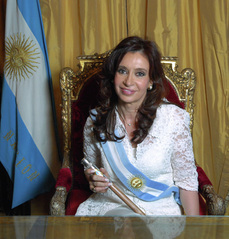 by Yoon Joung Lee The majority of Argentineans describe Cristina Fernandes de Kirchner as a woman who is obsessed with her public image and has a strong will. Even before she became Argentina’s first elected female President and took over her husband's workplace in 2007, she’s had a long track-record in politics and her overall contribution to the Argentina’s politics has been enormous. Cristina Fernandes, a current president of Argentina, was born in 1953 in La Plata, Province of Buenos Aires. She graduated from the National University of La Plata majoring in law and she became active in the Peronist Youth movement that was an Argentine political movement started by former president Juan Peron and his second wife, Eva Person while she was in college. There, she met her future husband, Nestor Kichner during her study. They were married in 1975 and the couple moved to live in his hometown, Santa Cruz to work as lawyers. They have two children: Maximo and Florencia. At the end of 1980s, she began her political career. In 1991, she was elected to the provincial legislature while her husband was elected governor of Santa Cruz. From 1995 to 2007, she was numerously elected as a National Deputy and National Senator, and supported her husband in her capacity. Even when she had her own political weight in Congress as a senator, she actively supported her husband’s policies during his presidency from 2003 to 2007 when Argentina was in the midst of one of the worst economic and social crises in the country. As a First Lady of the country, Fernandes played a significant role as an itinerant ambassador for his government. However, her strong character and highly combative speech style created some opposition who complained about her extreme obsession of her health and fitness. At the 2005 legislative elections, Fernandes became her party’s main Senator candidate in the Province of Buenos Aires district. She was competing with her main rival, Hilda Gonzales, the wife of former president Eduardo Duhalde (2002~2003) and won the elections by 25% margin. When Nestor Kirchner decided not to run for reelection in 2007, Fernandes replaced her husband as the candidate of the Justicialist party. She won in general elections by 45% of the vote in October 2007. In December 10, 2007, Fernandes was officially announced to be the first woman to be elected Argentina’s president in its 191-year history. Fernandes was the second female president of Argentina after Isabel Martines de Paron who became president after her husband, Juan Peron’s death. Without any death involved, this transition was the first time when a democratic head of state was replaced by his spouse. In her speech during her campaign, she revealed that she would continue her husband's policies, with a particular focus on international ties. On the other hand, she knew her biggest challenges would be confronting growing inflation and tightening energy situation in Argentina. Despite her great ambition and huge expectations from the public, her presidency didn’t began peacefully. Throughout disloyalty and corruption of political leaders, a farmers' strike and economic turmoil; she has dramatically lost her popularity and credibility in 2008. The president's approval ratings have also collapsed to below 30%. Experts saw political miscalculations as the main cause of the crisis in Argentina. They also pointed out that the crisis in Argentina is not financial or economic, but political. Inflation and continuing energy shortages still seem to be real challenges for her administration. However, she is certainly leading Argentina to the economic recovery, even though many still live in poverty. She is often compared with Eva Peron who was the second wife of a former president Juan Domingo Person, and Hillary Clinton who was a former lady and US presidential hopeful. Both women had a formidable influence on their husband’s government, but they were never elected to the presidency. From 2008 to 2010, Fernandes was ranked in the magazine,Forbes, as one of the 100 most powerful women in the world. In 2010, she was also ranked in the magazine Time as third in the list of the Top 10 Female Leaders of the World. |
Archives
July 2017
Categories
All
|
 RSS Feed
RSS Feed